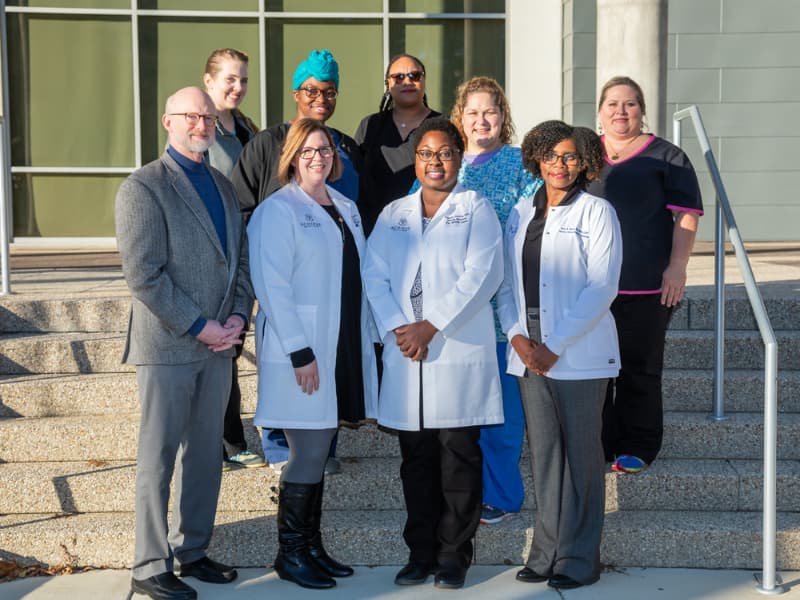Hearing aids slow cognitive decline in older adults with hearing loss and risk for dementia

Using hearing aids to treat hearing loss in older adults already at an increased risk for dementia may slow the deterioration of thinking and memory.
That’s the key finding of the Aging and Cognitive Health Evaluation in Elders study, a three-year clinical trial conducted at four clinical sites, including The Memory Impairment and Neurodegenerative Dementia Center, The MIND Center, for short, at the University of Mississippi Medical Center.
The ACHIEVE clinical trial, the largest ever to investigate the impact of hearing intervention on cognitive decline, was published in The Lancet and presented at the Alzheimer’s Association International Conference Tuesday in Amsterdam.
The randomized controlled trial began in 2018 and recruited 977 participants, 243 of those from The MIND Center. They ranged in age from 70 to 84.
Of the participants, 238 were part of an ongoing study of heart health and had increased risk factors for cognitive decline, while 739 were healthy volunteers newly recruited for the study.
Hearing aids benefitted the heart health study participants the most, slowing cognitive decline by 48 percent over three years.

Dr. Thomas Mosley, Robbie and Dudley Hughes MIND Center Chair and Director, The MIND Center, and principal investigator for the UMMC site, said the results are significant because those at highest risk for cognitive decline may benefit most from an intervention aimed at hearing loss.
“This provides one additional important, low-risk target for us to help patients with medical, behavioral and lifestyle strategies to delay or prevent cognitive decline and dementia with age,” said Mosley, also chair of the ACHIEVE Neurocognitive Committee, which oversaw the neurocognitive assessments and primary neurologic outcomes for the study.
“Given the rapidly increasing rates of cognitive decline and dementia worldwide, due to our aging population, addressing hearing loss may be a particularly important target in global efforts to reduce the rate of dementia because hearing loss is very common in older adults and often goes untreated.”
Hearing loss is present in 65 percent of adults over age 60.
Dr. Sarah Faucette, associate professor in the Department of Otolaryngology – Head and Neck Surgery and clinical research audiologist with The MIND Center, isn’t surprised by the results because research has already established a relationship between hearing loss and the decline in memory and thinking abilities.

“What we didn’t know was if we could affect that relationship by treating hearing loss,” said Faucette, the primary site audiologist and coordinator. “The results were astounding. If we treat hearing loss in adults who are at a higher risk of developing dementia, we see cognitive decline slowing down by almost half.”
Hearing loss affects adults socially because they tend to withdraw from social activities and feel more isolated, emotionally because they tend to have a higher rate of depression, and physically because it changes the structure and functioning of the brain, Faucette explained.
“I have seen the impact that the hearing program has made on their lives, not just cognitively but also emotionally and socially,” said Faucette. “I have seen participants re-join their book clubs, feel more confident in their environment when they are going for walks, keep up with family conversations better. I could go on.”
Researchers found that the effects of hearing aids differed significantly between the two groups. While those at an increased risk for dementia showed a significant cognitive decline, there was no measurable effect on the healthy volunteers.
They believe that’s because the heart health study group participants had a nearly three-fold faster rate of cognitive decline over the healthy volunteer group, allowing researchers to see the beneficial effects of hearing aids during the three-year study.
Researchers believe hearing aids could also benefit the healthy group, but it would take longer than three years to see the effects.
Faucette hopes the results will impact policy by creating more affordable access and insurance coverage for hearing interventions in adults, and that geriatricians will consider hearing intervention when treating patients with cognitive decline.

“Currently, we are just scraping the surface of our data and evaluating primary study outcomes, which have been groundbreaking,” she said.
Researchers believe one way hearing aids may slow down the progression of dementia is by making listening easier for the brain. But more research is needed to understand the longer-term benefits of hearing interventions.
Until researchers know more about the association between cognitive decline and hearing loss, they recommend older adults have their hearing checked regularly and receive treatment for any issues.
“Cognitive decline has proved remarkably difficult to treat,” said Mosley. “There are numerous failed trials conducted over the past few decades. So, I must admit, I was surprised by the outcome of this study. Very pleasantly surprised.”


